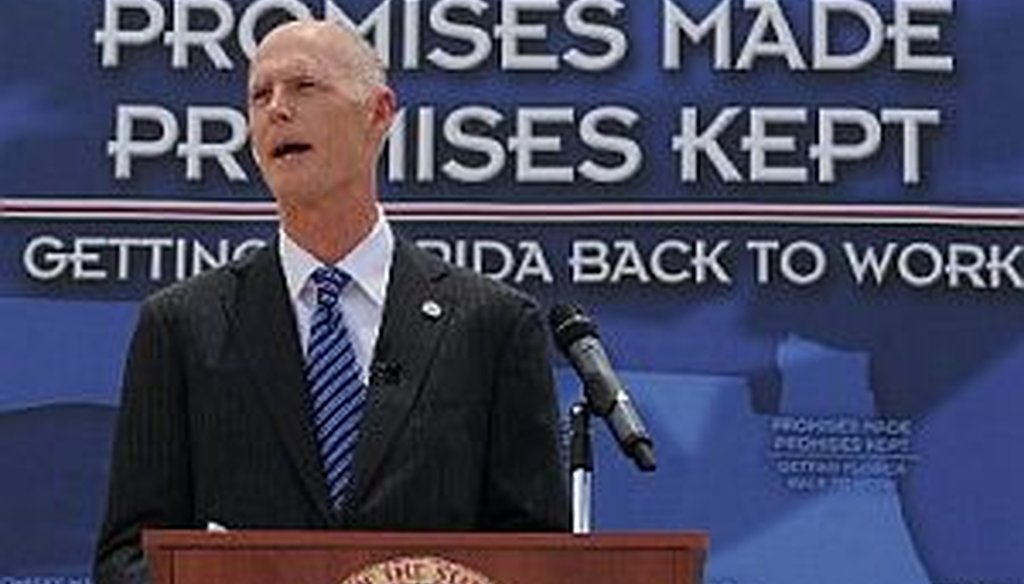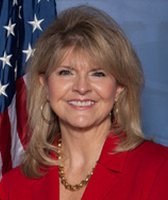Stand up for the facts!
Our only agenda is to publish the truth so you can be an informed participant in democracy.
We need your help.
I would like to contribute

PolitiFact Florida measures Gov. Rick Scott's promises on the Scott-O-Meter.
Politically unknown in 2010, millionaire businessman Rick Scott needed an opening against the GOP establishment’s first choice for governor. He found one in Attorney General Bill McCollum’s waffling on a controversial Arizona immigration law popular among conservatives.
The law made "common sense" to Scott, who poured part of his fortune into a television campaign promising to bring it to Florida.
Scott didn’t stop there, rounding out his jobs-centered message with pledges to ban embryonic stem cell research and safely expand offshore drilling. Where McCollum veered middle, Scott pulled right.
Flash forward. As Scott prepares for his second run for governor, pointed talk about immigration, oil drilling and other controversial conservative issues is gone — replaced by promises of more public education funding, tax cuts for businesses and families, and back-slapping over the likelihood of record tax collections.
Without a challenge from conservatives, Scott increasingly is highlighting moderate policies and ditching pledges that could cost him among independent voters, a coveted slice of the electorate that historically decides the governor’s race.
Sign up for PolitiFact texts
"Business people have to be pretty realistic," said Aubrey Jewett, a University of Central Florida political science professor. "I think he just saw that the way he was going, and the way he was governing, was a path to defeat."
Polls show Scott, 60, trailing party-switching former Gov. Charlie Crist. The latest poll, released this week by Democratic pollsters Public Policy Polling, showed Scott losing to Crist by 12 percentage points and essentially tied with Democratic candidate Nan Rich, a former state senator from Weston who has little statewide name recognition.
PolitiFact Florida is tracking 57 promises Scott made in his 2010 campaign for governor. Through nearly his first three years in office, Scott has failed to pursue some of his most conservative promises, including those on immigration and oil drilling. See his complete scorecard here.
Political experts see a tough road ahead. Scott must court middle-of-the-road voters without leaving vocal tea party backers in the ditch.
"He’s trying to mend the middle course to some degree, but he can’t go too far away from his roots," said Darryl Paulson, professor emeritus of government at the University of South Florida St. Petersburg.
The biggest thing going for Scott is an improving economy, which he’ll make the biggest issue of his campaign, Paulson said.
"With respect to the other issues, I think his strategy is going to be avoidance more than anything else," Paulson said.
Scott’s re-election team does not need the advice, having spent months already pushing a "Crist crash vs. Scott surge" narrative that pins Florida’s unraveling economy on Crist. (Neither candidate is officially in the race, for the record, and Scott declined to comment through a spokeswoman.)
"His slogan was ‘Let’s get to work,’ " said Lenny Curry, Republican Party of Florida chairman. "That was his big promise, and that’s what Floridians needed and cared about."
Democratic operatives aren’t buying the recalculations. They say Scott’s moderate overtures are really just different toes dipped in the water. It’s evidenced by him "splitting the baby" on issues to placate far-right conservatives, said Steve Schale, a Democratic strategist who is informally advising Crist.
"I don’t think that’s the real Rick Scott," Schale said. "I don’t think he’s comfortable occupying that space, which is why he never really goes there."
Scott may not talk about an Arizona immigration law, but he vetoed a bipartisan bill that would have helped children of undocumented immigrants apply for temporary driver’s licenses. And he refused to back up his call for a $51 billion Medicaid expansion by lobbying the Legislature or demanding a special session.
He also wants Florida to pull out of a nationwide consortium developing new student assessments, claiming it’s a federal intrusion.
Scott will be smart to keep the focus on the economy and public education, things important to prized, and highly informed, swing voters "since time began," said David Johnson, a Republican campaign consultant and former RPOF executive director.
Still, widening Scott’s appeal to independents and female voters remains a challenge. Independents prefer Crist 57 percent compared to 33 percent for Scott, according to the PPP poll. Just 28 percent of women said they approved of Scott, while 62 percent disapproved.
Like other Republicans interviewed for this story, Johnson said he does not see Scott backing off of anything substantial. Places where he failed to keep his word from 2010 are not that pertinent to voters, Johnson said.
For Patricia Sullivan, a Mount Dora tea party activist and homeschooler, the biggest letdown from Scott’s early days to now is that he has not followed up on a proposal for education savings accounts. The voucher-like program would allow state dollars to follow students to a public or private school. The idea failed in 2011 as Scott signed other school-choice ideas into law.
"When he focuses on our state, he does very well," Sullivan said. "When he embraces federal policies that are not the best for our state in regards to health care and education, then I am not very enthused."
It’s tough to tell where Scott is on many issues because his record is schizophrenic, said former state Sen. Paula Dockery, R-Lakeland. Dockery, who originally supported Scott and was once considered to be his choice for lieutenant governor, has become openly critical of him.
"He had a blank slate. He said he was an outsider and he said he was going to create jobs," Dockery said. "Now the product is known, and it’s not understood, and it’s not one that is getting rave reviews."
Our Sources
See promises






































